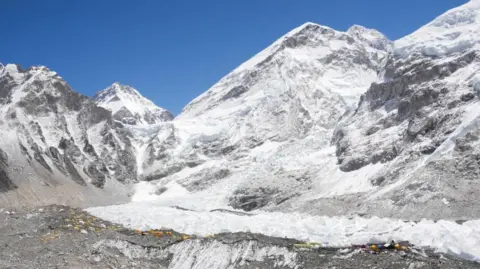British soldiers make Everest history using new method
 Sandro Gromen
Sandro GromenFour British former special forces soldiers have set a record by climbing Mount Everest in under five days without acclimatising on the mountain, as part of a high-speed expedition controversially aided by xenon gas.
The team, which included a UK government minister, summited the world's highest peak early on Wednesday.
Xenon was used to help them pre-acclimatise to low oxygen at high altitudes. Climbers usually spend between six to eight weeks on Everest before summiting.
Organisers said the use of xenon had made such a fast ascent possible. But the science around using the gas remains disputed and many in the mountaineering industry have criticised it.
Although this expedition is a record Everest ascent without acclimatising in the Himalayas, it's not the fastest Everest time.
That record still belongs to Lhakpa Gelu Sherpa, who climbed from base camp to the summit in 10 hours and 56 minutes in 2003 – but he did this after acclimatising on the mountain.
The xenon-aided team, accompanied by five Sherpa guides and a cameraman, reached the 8,849-metre (29,032-foot) summit early on Wednesday, and began their descent soon afterwards.
"They started on the afternoon of 16th May and summited on the morning of the 21st, taking four days and approximately 18 hours," expedition organiser Lukas Furtenbach told the BBC.
 Reuters
ReutersThe four former soldiers, who include veterans minister Alastair Carns, slept for six weeks in special tents before travelling to Nepal to help them acclimatise to decreased levels of oxygen at high altitude.
They then flew to Everest base camp from Kathmandu and started climbing straight away, Mr Furtenbach said. They used supplemental oxygen, like other climbers, during the expedition.
Climbers usually spend weeks going up and down between base camp and higher camps before making the final push for the summit.
They need to do that to get used to thinner oxygen levels at high mountain altitudes. Above 8,000m, known as the death zone, available oxygen is only a third of that present at sea level.
But the four British men in the team did none of that.
"The team made a three-month acclimatisation programme in simulated altitude before coming to Nepal," Mr Furtenbach said.
The simulated altitude was created in what is known as hypoxic tents from which oxygen is sucked out using a generator, bringing it to levels present at high mountain altitudes.
Then the climbers inhaled xenon gas at a clinic in Germany two weeks before the expedition, said Mr Furtenbach.
"It helps to protect the body from altitude sickness," he said.
Some researchers say xenon increases production of a protein called erythropoietin that fights hypoxia, a condition that occurs when the body can't get enough oxygen.
They say it does that by increasing the number of red blood cells that contain haemoglobin, which transports oxygen around the body, but this remains a disputed subject and many say further studies are required.
 Lukas Furtenbach
Lukas FurtenbachSome in the mountaineering industry have cautioned against the use of xenon gas.
"According to current literature, there is no evidence that breathing in xenon improves performance in the mountains, and inappropriate use can be dangerous," the International Climbing and Mountaineering Federation said in a statement in January.
"Acclimatisation to altitude is a complex process that affects the various organs/systems such as the brain, lungs, heart, kidneys and blood to different degrees, and is not fully understood.
"From a physiological point of view, a single, one-off drug cannot be the key to improved acclimatisation or increased performance."
Adrian Ballinger, who heads another expedition team climbing Everest from the Chinese side to the north, also makes his clients undergo pre-acclimatisation training like using hypoxic tents to shorten time on the mountains. But he opposes using xenon gas.
"If you're promoting xenon as a performance enhancer, but you're not also willing to examine what that means for fairness and integrity in the mountains, it's a problem," he told the BBC.
"People are grasping at shortcuts instead of doing the real work of acclimatisation and training."
But now that the British team have made their groundbreaking Everest ascent, expedition operators think, and some worry, that this method may be used by other climbers too.
"If that happens then it will certainly have a direct, negative impact on the tourism industry as the length of time mountaineers stay will come down significantly," said Damber Parajuli, president of the Expedition Operators Association of Nepal.
"Also, acclimatising on the mountains is the basic rule of mountaineering. If that is not done then authorities should not be giving them certificates certifying that they climbed the mountain."
Nepal's tourism department officials said they were not aware the British team were climbing Everest without acclimatisation.
"Now that we know about it, we will be discussing the issue and decide on our future course of action," Narayan Regmi, director general at Nepal's department of tourism told the BBC.
But why climb the highest peak at such speed?
"A shorter expedition has a lower carbon footprint and less ecological impact," said Mr Furtenbach.
"And it is safer for climbers because they can climb the mountain in good health and they are exposed to high altitude risks and mountain hazards for shorter time compared to when they are acclimatising on the mountain."
